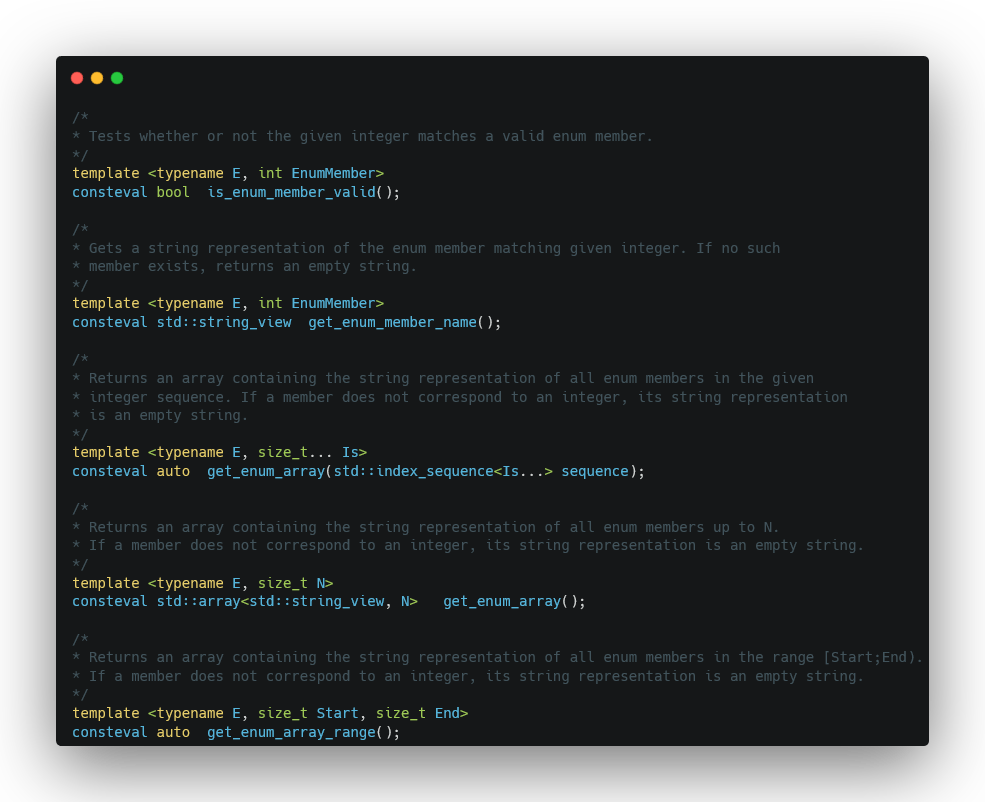These are functions that allow compile-time mapping of enum members to their string representation.
Said differently, it means that with an integer, you can get an std::string_view of what that integer corresponds to in any enum.
For example:
enum e_example {
FOO,
BAR,
SIZEOF_ENUM
};
constexpr auto name = const_enum::get_enum_member_name<e_example, 1>();
std::cout << name << '\n'; // Prints "BAR"Anything, really. Maybe you want to debug your code and know what that int in the console means without having to dig through header files. Maybe you cannot be bothered to manually declare a std::map by copy pasting each enum value twice. Or maybe you just want to do cool shit with constexpr and templates.
std::map<e_example, std::string_view> my_map = {
{FOO, "FOO"},
{BAR, "BAR"},
// etc. Boring. Error-prone. Cringe as shit.
}
// Exciting. Error-free. Based.
constexpr auto enum_names = const_enum::get_enum_array<e_example, SIZEOF_ENUM>();You need C++17 or greater for this to work, because it's using std::string_view. This implementation has been made for the MSVC compiler, but it can certainly be ported over to gcc/clang/whatever.
To use, simply include const_enum.hpp. Functions are in the const_enum namespace. Examples are available in the examples directory, and are also below, because you probably can't be bothered:
enum e_example {
FOO = 0,
BAR,
FOOBAR = 4,
FIZZ,
BUZZ,
SIZEOF_ENUM
};
/*
* You can get an array matching your enum, containing all enum names as string_views.
* If there are values not contained in your enum, they're replaced by an empty string.
*/
constexpr auto names_array = const_enum::get_enum_array<e_example, SIZEOF_ENUM>();
// Returns ["FOO", "BAR", "", "", "FOOBAR", "FIZZ", "BUZZ"]
/*
* You can also just take a range in the enum instead of the whole thing:
*/
constexpr size_t offset = 4;
constexpr auto ranged_names_array = const_enum::get_enum_array_range<e_example, offset,SIZEOF_ENUM>();
// Returns ["FOOBAR", "FIZZ", "BUZZ"]
/*
* Or simply get the string representation of any integer you'd like.
* Once again, empty string means no matching enum value.
*/
constexpr int check_me = 6;
constexpr auto name = const_enum::get_enum_member_name<e_example, check_me>();
// Returns "BUZZ"
/*
* If you just want to check if a certain value has a matching enum member, use this:
*/
constexpr bool has_member_3 = const_enum::is_enum_member_valid<e_example, 3>();
// Returns false
constexpr bool has_member_4 = const_enum::is_enum_member_valid<e_example, 4>();
// Returns true
/*
* Once you have determined enum values at compile-time, it's very easy to get what
* you want at runtime, just index the array. If you use a library with constexpr maps,
* you could even make it so you have a constexpr map of values.
*/
for (int i = 0; i < SIZEOF_ENUM; ++i)
std::cout << std::format("At runtime, {} corresponds to '{}'\n", i, names_array[i]);Here is a pretty picture of available functions:
